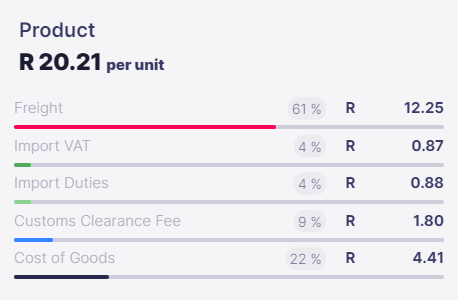

Alibaba.com is one of the best resources for businesses sourcing quality goods from China. But many business operators have been frustrated by the lack of safe and transparent ways to import your packages into South Africa. With Airpool, getting goods from China to your doorstep is now transparent, cost-effective, and really easy. Here’s how it works.
Alibaba is often the first port of call for businesses that want to get quality goods direct from China. The selection is unmatched, the prices are often unbeatable and, when used correctly, the service is a safe and reliable way to buy merchandise.
Of course, buying the right goods at the best price, in the quantities you need, is only half the challenge. You need a safe, efficient and transparent way to actually get those goods to your warehouse, without eating into your margins.
For South African businesses there’s now a great solution. You can use Airpool when purchasing through Alibaba, ensuring your items arrive quickly, efficiently, and without any unexpected delays or hidden costs. Best of all, it’s a much easier way to import goods.
To help first-time buyers navigate the sometimes confusing world of Alibab.com’s vast market, we’ve created a simple guide that explains how Alibaba and Airpool work so well together, to get you more for less.
The world’s trading platform
It may be no exaggeration to say that Alibaba is the portal to China. Alibaba.com is the world’s largest online trading platform for business and offers a dizzying selection of goods at unbeatable prices. Of course, the sheer variety can be overwhelming for first-time users.
Fortunately, the purchasing process is relatively simple.
1. Create an account
Once you’ve set up an account, you will have the option to choose your currency. Many buyers opt to set the currency to USD. However, you can also set the currency to local CNY. That can be useful if you don’t want to recalculate the price as the dollar fluctuates against the Yuan.
2. Source your product
Finding the ideal product is a little more complicated than walking into a trusted retailer and choosing an item. As Alibaba.com is a platform for sellers, you need some means to evaluate merchants. Fortunately, the service offers a number of ways to reassure buyers of quality goods and services.
Quality control
As a first step, ensure you purchase from a Verified Supplier. To qualify as a Verified Supplier on Alibaba, the seller has to be assessed by an independent institution.
Some sellers also offer Alibaba’s Trade Assurance, which gives buyers recourse if there is a problem with the quality of goods, or goods are dispatched late.
Minimum order requirements
Sellers may set a minimum order quantity (MOQ) on goods. That is the smallest number of units you can purchase in a single order.
When you’re testing out a new product line, your order size will likely be relatively small. It is therefore important to be aware of each seller’s MOQ.
Request for Quotation (RFQ)
Once you’ve narrowed down your shortlist of potential suppliers, you can send a Request for Quotation (RFQ).
Broadly speaking, you contact the vendor listing the specific goods you want. You should also specify the quantities you want to purchase and any delivery requirements you have.
Even if you have only identified one suitable seller, the RFQ is a good way to initiate contact and get a precise quote for your order. You can also send RFQs to multiple vendors to get quotes from various sources.
Time to chat
Once you’ve established contact with a vendor, they will likely seek more details about your requirements. At this point, you may need to answer broad questions about the specs of the goods you want, such as weight, dimension, HS code, and colour.
It’s important to get absolute clarity on all these points for two reasons. First, and most obviously, you need to know precisely what you are paying for. But also, factors such as weight and dimension will affect shipping.
3. Finalise your consignment terms
Once you’ve confirmed a final quotation from the supplier you also need to get confirmation of the finished package’s weight and dimensions. These are essential for shipping purposes.
Using the Airpool consolidation hub, it’s easy to upload these details, to ensure seamless shipping.
Similarly, you must provide your Airpool postal code to the seller. You also need to negotiate the terms of delivery from the supplier to the local Airpool hub.
Finalise your shipment preparation by requesting a packing list and commercial invoice from the supplier.
4. Create your Airpool order for seamless international shipping
Use Airpool’s simple online platform to create your order and generate a waybill. The Alibaba supplier must attach the waybill to the goods, so the consolidation hub can identify and track your package.
5. Pay for your goods
Alibaba.com offers a secure portal through which to pay your supplier. Remember to also request a tax invoice, if needed.
6. Your goods are on their way!
Now for the easy part. You sit back and relax, in the knowledge your goods will arrive in South Africa as efficiently as possible.
At this point, the supplier delivers the package to Airpool’s hub in China. Airpool manages the rest, including freight, customs clearance, import VAT and duties.
You can track your package at every point of the transit process, and there are no surprise fees or hidden costs.
Stop stressing about logistics and free up more time to grow your business. Get in touch with Airpool. Our friendly team will provide you with expert guidance on how to get the most out of your Alibaba experience.
Trending products to sell online in 2022! [UPDATED]
Landed cost is the sum of all expenses associated with importing your goods from China to South Africa. This includes the cost of the goods paid to your supplier, the shipping costs, clearance costs and the import taxes & duties.
It is represented on a per unit cost and helps you with:
Note: This is not what you are paying to Airpool but rather what you are paying to all the suppliers and relevant parties: Airpool, the Manufacturer of the goods and the Import Taxes (VAT & Duties)
